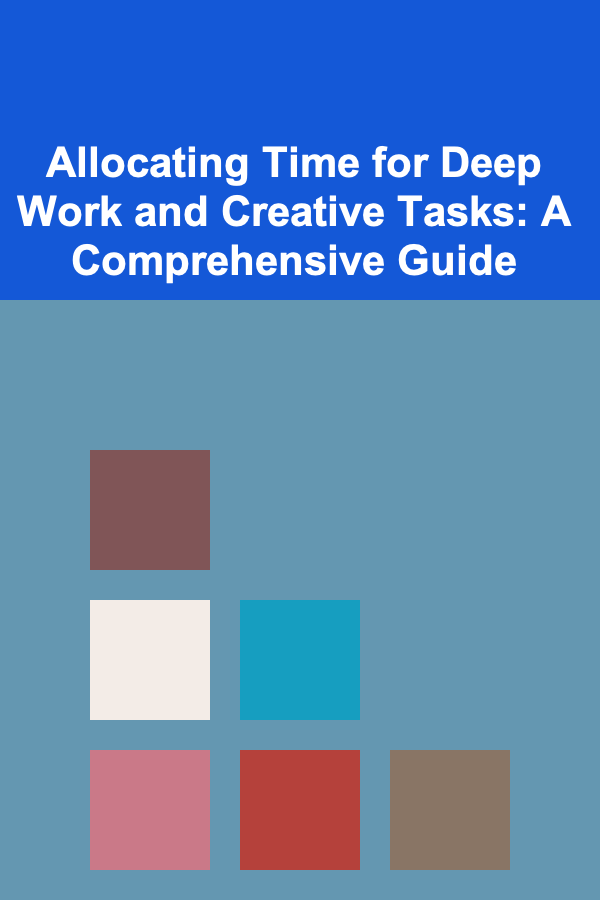
Allocating Time for Deep Work and Creative Tasks: A Comprehensive Guide
ebook include PDF & Audio bundle (Micro Guide)
$12.99$6.99
Limited Time Offer! Order within the next:

In today's fast-paced, distraction-filled world, carving out dedicated time for deep work and creative tasks can feel like an insurmountable challenge. We're constantly bombarded with emails, notifications, meetings, and the relentless pressure to be perpetually responsive. However, mastering the art of time allocation for these crucial activities is not just beneficial; it's essential for achieving meaningful breakthroughs, fostering innovation, and ultimately, reaching one's full potential. This guide provides a comprehensive framework for understanding deep work and creativity, identifying obstacles, and implementing practical strategies to reclaim your time and unlock your creative power.
Understanding Deep Work and Creativity
What is Deep Work?
The concept of "deep work" was popularized by Cal Newport in his book of the same name. He defines it as: "Professional activities performed in a state of distraction-free concentration that push your cognitive capabilities to their limit. These efforts create new value, improve your skill, and are hard to replicate." Deep work is about focusing intently on a demanding task, free from distractions, allowing you to achieve significant progress and produce high-quality results. It's about going beyond the superficial and engaging with the subject matter on a profound level.
Contrast this with "shallow work," which Newport describes as: "Noncognitively demanding, logistical-style tasks, often performed while distracted. These efforts tend not to create much new value in the world and are easy to replicate." Shallow work includes things like answering emails, attending routine meetings, social media browsing, and performing administrative tasks. While shallow work has its place, an overreliance on it prevents you from engaging in the deep, meaningful work that truly moves the needle.
The Nature of Creativity
Creativity, often intertwined with deep work, is the ability to generate novel and useful ideas. It's not merely about being "artsy"; creativity is fundamental to problem-solving, innovation, and adaptation in any field. It involves connecting seemingly disparate concepts, exploring new possibilities, and pushing the boundaries of what's currently known.
There are various perspectives on creativity, but a common thread is the importance of both divergent and convergent thinking. Divergent thinking involves generating a wide range of ideas, exploring different avenues, and brainstorming without judgment. Convergent thinking, on the other hand, involves evaluating these ideas, selecting the most promising ones, and refining them into concrete solutions.
Creativity often thrives in environments that foster curiosity, experimentation, and a willingness to embrace failure. It requires a certain level of cognitive flexibility and the ability to challenge assumptions.
The Symbiotic Relationship
Deep work and creativity are often mutually reinforcing. Deep work provides the necessary focus and concentration to delve into complex problems and explore creative solutions. Conversely, creative tasks can benefit from periods of intense focus and deep engagement. When you're deeply immersed in a creative endeavor, you're more likely to generate original ideas and push the boundaries of your understanding.
Identifying Obstacles to Deep Work and Creative Flow
Before we can effectively allocate time for deep work and creative tasks, we need to understand the common obstacles that prevent us from doing so. These obstacles can be external, such as interruptions and distractions, or internal, such as procrastination and lack of motivation.
External Distractions
- Notifications: Email, social media, and instant messaging notifications are notorious attention thieves. They constantly interrupt our flow and pull us away from our work.
- Interruptions: Colleagues, family members, or clients can interrupt our work, disrupting our concentration and making it difficult to regain focus.
- Meetings: Too many meetings can eat into our time, leaving little room for deep work or creative endeavors.
- Open Office Environments: While designed to foster collaboration, open offices can be noisy and distracting, making it challenging to concentrate.
- Environmental Noise: Construction, traffic, or even loud conversations can disrupt our focus and hinder our ability to think deeply.
Internal Distractions
- Procrastination: The tendency to postpone important tasks, often due to fear of failure or lack of motivation.
- Perfectionism: The unrealistic expectation of achieving flawlessness can lead to anxiety and prevent us from starting or completing tasks.
- Lack of Focus: Difficulty concentrating and staying on task, often due to stress, fatigue, or underlying mental health issues.
- Multitasking: The myth of multitasking -- attempting to perform multiple tasks simultaneously -- actually reduces productivity and hinders deep work.
- Fear of Failure: Worrying about not being good enough or failing to meet expectations can paralyze us and prevent us from taking risks.
Time Management Issues
- Poor Planning: Failing to schedule time for deep work and creative tasks, leading to them being constantly pushed aside.
- Overcommitment: Taking on too many responsibilities and lacking the ability to say "no," resulting in feeling overwhelmed and stretched thin.
- Lack of Prioritization: Not identifying and prioritizing the most important tasks, leading to wasted time on less critical activities.
- Unrealistic Expectations: Underestimating the time required to complete tasks, leading to rushed work and compromised quality.
- Inefficient Work Habits: Using outdated or inefficient workflows, wasting time and energy on unnecessary steps.
Strategies for Allocating Time for Deep Work and Creative Tasks
Now that we understand the obstacles, let's explore practical strategies for reclaiming our time and making space for deep work and creative endeavors.
1. Time Blocking and Scheduling
Time blocking is a powerful technique that involves scheduling specific blocks of time for particular activities. This helps you prioritize deep work and creative tasks and ensures that they don't get squeezed out by other demands.
- Identify Your Peak Performance Times: Determine when you are most alert and focused. Schedule your most demanding tasks for these periods.
- Allocate Specific Time Blocks: Create dedicated blocks of time for deep work, free from meetings, emails, and other distractions. Consider using calendar software to block out these times.
- Be Realistic and Flexible: Don't try to schedule every minute of your day. Leave some buffer time for unexpected events and allow for flexibility.
- Prioritize Deep Work: Treat your deep work blocks as non-negotiable appointments. Avoid scheduling other activities during these times unless absolutely necessary.
- Experiment with Different Block Lengths: Some people prefer shorter, more frequent blocks, while others prefer longer, uninterrupted sessions. Find what works best for you. Pomodoro Technique (25 min work, 5 min break) can be helpful.
2. Minimizing Distractions
Creating a distraction-free environment is crucial for deep work. This involves both eliminating external distractions and managing internal ones.
- Turn Off Notifications: Disable email, social media, and instant messaging notifications. Consider using apps that block distracting websites and apps.
- Create a Dedicated Workspace: Designate a specific area for deep work, free from interruptions and visual clutter.
- Communicate Your Needs: Let colleagues, family members, and clients know when you need uninterrupted time for focused work.
- Use Noise-Canceling Headphones: Block out distracting sounds and create a more peaceful environment.
- Practice Mindfulness and Meditation: Train your mind to focus and resist distractions. Even a few minutes of meditation each day can make a difference.
3. Embracing the Four Philosophies of Deep Work
Cal Newport proposes four different philosophies for integrating deep work into your life. The best approach depends on your personality, work style, and circumstances.
- The Monastic Philosophy: This approach involves completely eliminating all shallow work and distractions, dedicating your life entirely to deep work. This is the most extreme approach and is typically only suitable for academics, artists, or those who can afford to completely isolate themselves.
- The Bimodal Philosophy: This approach involves alternating between periods of intense deep work and periods of shallow work. For example, you might dedicate several weeks or months to a deep work project, followed by a period of catching up on administrative tasks and other responsibilities.
- The Rhythmic Philosophy: This approach involves establishing a regular, recurring schedule for deep work. For example, you might dedicate two hours every morning to deep work. This is a more sustainable approach for those with demanding schedules.
- The Journalistic Philosophy: This approach involves fitting deep work into your schedule whenever you have a free moment. This requires a high level of flexibility and the ability to quickly switch between deep and shallow work.
4. Batching Similar Tasks
Batching involves grouping similar tasks together and performing them in a single block of time. This can improve efficiency and reduce mental fatigue.
- Email Batching: Instead of checking email constantly throughout the day, dedicate specific times to process and respond to emails.
- Meeting Batching: Schedule all your meetings on the same day or in the same block of time, leaving other days free for deep work.
- Administrative Task Batching: Group all your administrative tasks together and perform them in a single session.
- Creative Task Batching: Dedicate a specific time for creative tasks such as writing, designing, or brainstorming.
5. Saying "No" and Setting Boundaries
Learning to say "no" to requests that don't align with your priorities is crucial for protecting your time and energy. Setting boundaries helps you maintain focus and prevent burnout.
- Prioritize Your Commitments: Identify your most important goals and tasks and focus on those first.
- Decline Unnecessary Requests: Don't be afraid to say "no" to requests that are not aligned with your priorities or that you don't have time for.
- Delegate Tasks: If possible, delegate tasks to others to free up your time for more important activities.
- Set Clear Boundaries: Establish clear boundaries between your work and personal life to prevent work from encroaching on your free time.
- Communicate Your Boundaries: Let others know your boundaries and be consistent in enforcing them.
6. Fueling Your Brain for Deep Work
Your physical and mental well-being play a significant role in your ability to engage in deep work. Taking care of your brain is essential.
- Get Enough Sleep: Prioritize sleep to improve focus, concentration, and cognitive function.
- Eat a Healthy Diet: Consume nutrient-rich foods that support brain health. Avoid processed foods, sugary drinks, and excessive caffeine.
- Exercise Regularly: Physical activity improves blood flow to the brain and enhances cognitive function.
- Stay Hydrated: Dehydration can impair cognitive function. Drink plenty of water throughout the day.
- Take Breaks: Regular breaks can help prevent mental fatigue and improve focus. Get up and move around, stretch, or do something enjoyable.
7. Cultivating a Creative Mindset
Creating an environment that fosters creativity is essential for generating innovative ideas.
- Embrace Curiosity: Be open to new ideas and perspectives. Ask questions and explore different avenues.
- Experiment and Take Risks: Don't be afraid to try new things and make mistakes. Failure is a valuable learning opportunity.
- Seek Inspiration: Expose yourself to new experiences, read books, watch movies, and attend lectures.
- Connect with Others: Collaborate with others and share ideas. Different perspectives can spark new insights.
- Practice Mindfulness: Be present in the moment and pay attention to your thoughts and feelings. This can help you access your intuition and creativity.
8. Tools and Technology for Deep Work
There are numerous tools and technologies available to help you manage your time, minimize distractions, and enhance your focus.
- Focus@Will: A music service designed to enhance focus and concentration.
- Freedom: An app that blocks distracting websites and apps.
- Forest: An app that encourages you to stay focused by planting a virtual tree that withers if you leave the app.
- Todoist/Asana/Trello: Task management apps to organize and prioritize tasks.
- Cold Turkey Blocker: Another website and application blocker.
9. Overcoming Procrastination
Procrastination is a common obstacle to deep work and creative tasks. Addressing the root causes of procrastination is key.
- Break Down Tasks: Divide large tasks into smaller, more manageable steps.
- Set Realistic Goals: Avoid setting unrealistic goals that can lead to overwhelm and procrastination.
- Identify Your Triggers: Identify the situations or thoughts that trigger procrastination.
- Reward Yourself: Reward yourself for completing tasks, even small ones.
- Practice Self-Compassion: Be kind to yourself and avoid self-criticism. Everyone procrastinates sometimes.
10. Tracking and Evaluating Your Progress
Regularly track your progress and evaluate your strategies to identify what works best for you.
- Keep a Time Log: Track how you spend your time each day to identify time-wasting activities.
- Review Your Schedule: Regularly review your schedule and make adjustments as needed.
- Evaluate Your Productivity: Assess your productivity and identify areas for improvement.
- Experiment with Different Techniques: Try different strategies and techniques to find what works best for you.
- Be Patient and Persistent: It takes time and effort to develop effective time management habits. Be patient with yourself and persistent in your efforts.
Conclusion: Embracing the Power of Deep Work and Creativity
Allocating time for deep work and creative tasks is an ongoing process that requires discipline, self-awareness, and a willingness to experiment. By understanding the principles of deep work, identifying obstacles, and implementing practical strategies, you can reclaim your time, unlock your creative potential, and achieve meaningful breakthroughs in your work and life. It's not about working harder, but about working smarter and prioritizing the activities that truly matter. Embrace the power of deep work and unleash your creative force to create a more fulfilling and impactful life.

How to Choose the Right Location for Your Investment Property
Read More
How to Cut Costs on Groceries Without Compromising Nutrition
Read More
How to Make Your Investment Property Eco-Friendly
Read More
How to Sell Your Unique Antiques on Instagram: A Comprehensive Actionable Guide
Read More
Understanding Warfare in the Ancient World
Read More
The Playful Parent: Bringing Joy and Laughter to Family Life
Read MoreOther Products

How to Choose the Right Location for Your Investment Property
Read More
How to Cut Costs on Groceries Without Compromising Nutrition
Read More
How to Make Your Investment Property Eco-Friendly
Read More
How to Sell Your Unique Antiques on Instagram: A Comprehensive Actionable Guide
Read More
Understanding Warfare in the Ancient World
Read More